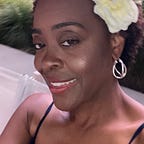Decolonizing Beauty
I grew up on 90’s hip hop music that reflected a burgeoning Black conscious movement. When I was younger growing up in a working-class neighborhood in Philadelphia, I never felt insecure about being Black, but I might have felt insecure because I was a skinny, flat-chested girl with big light brown eyes that made me look sleepy all the time. I never questioned my Blackness though. It might have been because I grew up in a household where having naturally kinky and curly hair was viewed as “good” and “beautiful” or because my father drilled my sister and I on lessons of Black history and culture. Everywhere we looked around our home, we saw Black images in the paintings that our parents bought for our walls, in the magazine images of Essence and Ebony magazine that lined our glass coffee table, and of course in the people who we saw on a regular basis. Philadelphia’s Black population is about 50% percent. Therefore, my parents made sure we had black pediatricians, black dentists, a black orthodontist, and that we regularly patronized black businesses. By the time I was 17 years old, books like the Autobiography of Malcolm X, The Isis Papers by Dr. Frances Cress Welsing, and Message to the Black Man by Elijah Muhammad had changed the course of my life as the ideas and concepts in those books were deeply embedded into the psyche of my Black mind. However, even with that upbringing, my radical Black father, our Black home library, our…
